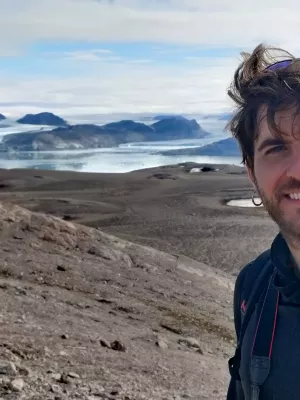
Albert Brangarí
Researcher

Subarctic winter warming promotes soil microbial resilience to freeze–thaw cycles and enhances the microbial carbon use efficiency
Author
Summary, in English
Climate change is predicted to cause milder winters and thus exacerbate soil freeze–thaw perturbations in the subarctic, recasting the environmental challenges that soil microorganisms need to endure. Historical exposure to environmental stressors can facilitate the microbial resilience to new cycles of that same stress. However, whether and how such microbial memory or stress legacy can modulate microbial responses to cycles of frost remains untested. Here, we conducted an in situ field experiment in a subarctic birch forest, where winter warming resulted in a substantial increase in the number and intensity of freeze–thaw events. After one season of winter warming, which raised mean surface and soil (−8 cm) temperatures by 2.9 and 1.4°C, respectively, we investigated whether the in situ warming-induced increase in frost cycles improved soil microbial resilience to an experimental freeze–thaw perturbation. We found that the resilience of microbial growth was enhanced in the winter warmed soil, which was associated with community differences across treatments. We also found that winter warming enhanced the resilience of bacteria more than fungi. In contrast, the respiration response to freeze–thaw was not affected by a legacy of winter warming. This translated into an enhanced microbial carbon-use efficiency in the winter warming treatments, which could promote the stabilization of soil carbon during such perturbations. Together, these findings highlight the importance of climate history in shaping current and future dynamics of soil microbial functioning to perturbations associated with climate change, with important implications for understanding the potential consequences on microbial-mediated biogeochemical cycles.
Department/s
- Microbial Ecology
- Microbial Biogeochemistry in Lund
- MEMEG
- BECC: Biodiversity and Ecosystem services in a Changing Climate
- MERGE: ModElling the Regional and Global Earth system
Publishing year
2024-01
Language
English
Publication/Series
Global Change Biology
Volume
30
Issue
1
Document type
Journal article
Publisher
Wiley-Blackwell
Topic
- Climate Research
Keywords
- arctic ecosystems
- climate warming
- extreme weather events
- microbial growth
- microbial growth efficiency
- microbial respiration
- resistance
- temperature
Status
Published
Research group
- Microbial Ecology
- Microbial Biogeochemistry in Lund
ISBN/ISSN/Other
- ISSN: 1354-1013

